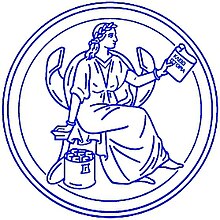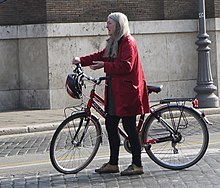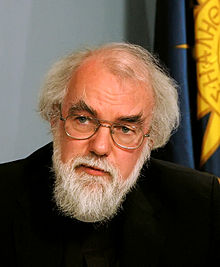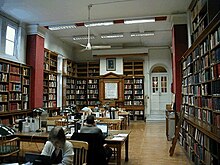British Academy
 The British Academy's premises on Carlton House Terrace | |
| Formation | 1902 (society) 1902 (Royal Charter) |
|---|---|
| Type | National academy |
| Legal status | Charity |
| Headquarters | London, SW1 United Kingdom |
Membership | 1000 |
President | Sir David Cannadine |
| Website | britac.ac.uk |
The British Academy is the United Kingdom's national academy for the humanities and the social sciences.
It receives an annual grant from the Department for Business, Innovation and Skills (BIS). In 2014/15 the British Academy's total income was £33,100,000, including £27,000,000 from BIS. £32,900,000 was distributed during the year in research grants, awards and charitable activities.[1]
The British Academy was established in 1902 and received its Royal Charter in the same year. It is now a fellowship of more than 1,000 leading scholars spanning all disciplines across the humanities and social sciences and a funding body for research projects across the United Kingdom. The academy is a self-governing and independent registered charity, based at 10–11 Carlton House Terrace in London.
Contents
1 Purposes
2 History
3 Fellowship
4 Funding schemes
5 International work
6 Higher education and research
7 British Academy's policy work
8 Public events
9 Award of prizes
10 Presidents of the British Academy, 1902–present
11 Secretaries of the British Academy, 1902–present
12 Publications
13 See also
14 References
15 External links
Purposes
The academy states its fundamental purposes under four headings:
- As a fellowship composed of distinguished scholars, elected by their peers, it takes a lead in representing the humanities and social sciences, facilitating international collaboration, providing an independent and authoritative source of advice, and contributing to public policy and debate.
- As a learned society, it seeks to foster and promote the full range of work that makes up the humanities and social sciences, including inter- and multi-disciplinary work.
- As a funding body, it supports excellent ideas, individuals and intellectual resources in the humanities and social sciences, enables UK researchers to work with scholars and resources in other countries, sustains a British research presence in various parts of the world and helps attract overseas scholars to the UK.
- As a national forum for the humanities and social sciences, it supports a range of events, activities and publications (print and electronic) which aim to stimulate curiosity, to inspire and develop future generations of scholars, and to encourage appreciation of the social, economic and cultural value of these disciplines.[citation needed]
History

The British Academy's royal seal depicts the Greek muse Clio. She was redrawn by designer and illustrator Debbie Cook in 2008.
The creation of a "British Academy for the Promotion of Historical, Philosophical and Philological Studies" was first proposed in 1899 in order that Britain could be represented at meetings of European and American academies. The organisation, which has since become simply "the British Academy", was initiated as an unincorporated society on 17 December 1901, and received its Royal Charter from King Edward VII on 8 August 1902.[2]
Since then, many of Britain's most distinguished scholars in the humanities and social sciences have been involved in the life of the academy, including John Maynard Keynes, Isaiah Berlin, C. S. Lewis and Henry Moore.
Until 1927–28 the academy had no premises. Then it moved to some rooms in No. 6 Burlington Gardens. In 1968 it moved the short distance to Burlington House. It subsequently moved to headquarters near Regent's Park. Then in 1998 the Academy moved to its present headquarters in Carlton House Terrace. Overlooking St James's Park, the terrace was designed by John Nash and built in the 1820s and 1830s. Number 10 was formerly the London residence of the Ridley family and number 11 was from 1856 to 1875 the home of Prime Minister William Gladstone.
In March 2010, the academy embarked on a £2.75m project to renovate and restore the public rooms in No. 11, following the departure of former tenant the Foreign Press Association, and link the two buildings together. The work was completed in January 2011 and the new spaces include a new 150-seat Wolfson Auditorium are available for public hire.
The history, problems and achievements of the academy have been recorded in works by two of its secretaries. Sir Frederic Kenyon's volume of 37 pages covers the years up to 1951;[3] Sir Mortimer Wheeler's volume covers the years 1949 to 1968.[4]
Fellowship

Professor Mary Beard, Fellow of the British Academy, filming in Rome, Italy

Rowan Williams, Fellow of the British Academy
Election as a Fellow of the British Academy recognises high scholarly distinction in the humanities or social sciences, evidenced by published work. Fellows may use the letters FBA after their names. Fellows are elected into one of the following disciplinary sections:[5]
- Humanities
- Classical Antiquity
- Theology and Religious Studies
- African and Oriental Studies
- Linguistics and Philology
- Early Modern Languages and Literatures
- Modern Languages, Literatures and other Media
- Archaeology
- Medieval Studies
- Early Modern History to c1800
- Modern History from c1800
- History of Art and Music
- Philosophy
- Social Sciences
- Law
- Economics and Economic History
- Anthropology and Geography
- Sociology, Demography and Social Statistics
- Political Studies: Political Theory, Government and International Relations
- Psychology
There are also three 'ginger groups' to address the specific needs of Management and Business Studies, Education, and Cultural, Communications, Media & Performance Studies.
Funding schemes

The British Academy has awarded prizes of £4,000 to 15 schools across the UK for encouraging innovative and creative foreign language teaching under the Schools Language Awards.
The British Academy channels substantial public funding into support for individuals and organisations pursuing humanities and social sciences research and scholarship in the UK and overseas. These funding schemes are designed to aid scholars at different stages of their academic career and include postdoctoral fellowships, Wolfson Research Professorships, Leverhulme Senior Research Fellowships, small research grants and British Academy Research Projects.
In addition to its main public funds supported by the Department for Business, Innovation and Skills, the academy also draws on private funds arising from gifts, legacies, contributions made by fellows and grants from research foundations to support a further range of research activities. In 2014/15, the academy received around £30m to support research and researchers across the humanities and social sciences. Funds available to the academy were invested in the following main areas: research career development; a portfolio of research grant opportunities, and international engagement. The demand and quality of applications submitted for academy funding remains high. This year the academy received around 3,600 applications and made 588 awards to scholars based in around 100 different universities across the UK – a success rate of 16%.
International work

British School at Athens, one of the six major British overseas research institutes supported by the British Academy.
In order to promote the interests of UK research and learning around the world, the Academy works to create frameworks to support international networking and collaboration and develop the role of humanities and social sciences research in tackling global challenges. It draws on expertise from a wide range of sources from within the fellowship and on specialist advice from its seven Area Panels for Africa, China, the Middle East, Europe, South Asia, and Latin America/Caribbean.
The Academy also funds and coordinates a network of overseas institutes which provide local expertise, logistical support and often a working base for UK scholars. These include research institutes in Amman, Ankara, Athens, Jerusalem, Nairobi, Rome and Tehran, as well as UK-based specialist learned societies which run strategic research programmes in other parts of the world including Africa, Latin America and South and South East Asia.
Higher education and research
As the UK's national voice for the humanities and social sciences, the British Academy seeks to promote and protect the interests and health of these disciplines and their research base. It makes independent representations to the government and other bodies on relevant higher education and research issues, contributes statements and submissions to formal consultations and organises a range of policy events and discussions, liaising regularly with learned societies, universities, national academies and other relevant organisations.
British Academy's policy work
The British Academy's Fellowship represents breadth and excellence of expertise across these disciplines, and the Academy's policy work is dedicated to applying that insight to policy issues for public benefit and societal wellbeing. Bringing independence, authority and objectivity to complex issues, the Academy's work enlightens the context, meaning and practicalities of policy challenges. Our work spans issues across public policy, skills, education and research. From reports to small meetings, the British Academy provides a forum for examining issues at the heart of society and the economy.
Public events

Three of the speakers at a British Academy panel discussion, "Where are all the women?"
The British Academy organises a wide-ranging annual programme of more than 50 public lectures, panel discussions, conferences and seminars showcasing new research and debating topical issues. This includes a number of long-established lecture series, such as the Shakespeare Lecture, first given in 1911. Most events are free and most take place at the Academy's headquarters in Carlton House Terrace.
Award of prizes

The President's Medal rewards signal service to the cause of the humanities and social sciences.
The British Academy awards a total of 15 Prizes and Medals, most of them awarded annually.
- British Academy President's Medal, created in 2010 and awarded to up to five recipients each year who have demonstrated "signal service to the cause of the humanities and social sciences"
- British Academy Medal, created in 2013 and awarded to up to three recipients each year "for landmark academic achievement in any of the humanities and social science disciplines supported by the Academy"
Burkitt Medal, created in 1923
Kenyon Medal, first awarded in 1957
Leverhulme Medal and Prize, created in 2002
Nayef Al-Rodhan Prize for Transcultural Understanding, established in 2013- Peter Townsend Policy Press Prize, created in 2011
- Wiley Prize for Psychology, founded in 2009
Presidents of the British Academy, 1902–present
The Lord Reay 1902–1907
Sir Edward Maunde Thompson 1907–1909
Samuel Henry Butcher 1909–1910
Sir Adolphus Ward 1911–1913
The Viscount Bryce 1913–1917
Sir Frederic Kenyon 1917–1921
The Earl of Balfour 1921–1928
H. A. L. Fisher 1928–1932
John William Mackail 1932–1936
Sir David Ross 1936–1940
Sir J. H. Clapham 1940–1946
Sir Idris Bell 1946–1950
Sir Charles Kingsley Webster 1950–1954
Sir George Norman Clark 1954–1958
Sir Maurice Bowra 1958–1962
The Lord Robbins 1962–1967
Sir Kenneth Clinton Wheare 1967–1971
Sir Denys Lionel Page 1971–1974
Sir Isaiah Berlin 1974–1978
Sir Kenneth James Dover 1978–1981
The Revd Owen Chadwick 1981–1985
Sir Randolph Quirk 1985–1989
Sir Anthony Kenny 1989–1993
Sir Keith Thomas 1993–1997
Sir Tony Wrigley 1997–2001
The Viscount Runciman of Doxford 2001–2004
The Baroness O'Neill of Bengarve 2005–2009
Sir Adam Roberts 2009–2013
The Lord Stern of Brentford 2013–2017
Sir David Cannadine 2017–present
Secretaries of the British Academy, 1902–present
Sir Israel Gollancz (1902–1930)
Sir Frederic G. Kenyon GBE, KCB (1930–1949)
Sir R. E. Mortimer Wheeler CH, CIE, MC (1949–1968)- Mr Derek Allen, CB (1969–1973)
- Dr N. J. Williams (1973–1977)
- Mr J. P. Carswell, CB (1978–1983)
- Mr P. W. H. Brown, CBE (1983–2006)
- Dr Robin Jackson (2006–2015)
Alun Evans Alun Evans (2015–present)
Publications
- Lectures and conferences papers
- British Academy Original Paperbacks
- British Academy Occasional Papers
- Proceedings of the British Academy
- Reissues of proceedings lectures
- Schweich Lectures on Biblical Archaeology
- Symposia
- Thank-Offering to Britain Fund Lectures
- Monographs
- Archaeological reports (including BAMA)
- British Academy Centenary Monographs
- Miscellaneous research publications
- Postdoctoral Fellowship Monographs
- Supplemental papers
- Research series
- Anglo-Saxon Charters
- Auctores Britannici Medii Aevi
- Classical and Medieval Logic Texts
- Corpus of Anglo-Saxon Stone Sculpture
- Corpus Signorum Imperii Romani
- Corpus vasorum antiquorum
- Corpus Vitrearum Medii Aevi
- Dictionary of Medieval Latin from British Sources
- Early English Church Music
- English Episcopal Acta
- Fontes Historiae Africanae'
- Oriental and African Archives
- Oriental Documents
- Records of Social and Economic History
- Sylloge of Coins of the British Isles
- Sylloge Nummorum Graecorum
- Tabula Imperii Romani
See also
- Category:Fellows of the British Academy
- Royal Society
References
^ British Academy Annual Report 2014–15. Download: "Archived copy". Archived from the original on 6 January 2012. Retrieved 14 December 2011.CS1 maint: Archived copy as title (link) .mw-parser-output cite.citation{font-style:inherit}.mw-parser-output q{quotes:"""""""'""'"}.mw-parser-output code.cs1-code{color:inherit;background:inherit;border:inherit;padding:inherit}.mw-parser-output .cs1-lock-free a{background:url("//upload.wikimedia.org/wikipedia/commons/thumb/6/65/Lock-green.svg/9px-Lock-green.svg.png")no-repeat;background-position:right .1em center}.mw-parser-output .cs1-lock-limited a,.mw-parser-output .cs1-lock-registration a{background:url("//upload.wikimedia.org/wikipedia/commons/thumb/d/d6/Lock-gray-alt-2.svg/9px-Lock-gray-alt-2.svg.png")no-repeat;background-position:right .1em center}.mw-parser-output .cs1-lock-subscription a{background:url("//upload.wikimedia.org/wikipedia/commons/thumb/a/aa/Lock-red-alt-2.svg/9px-Lock-red-alt-2.svg.png")no-repeat;background-position:right .1em center}.mw-parser-output .cs1-subscription,.mw-parser-output .cs1-registration{color:#555}.mw-parser-output .cs1-subscription span,.mw-parser-output .cs1-registration span{border-bottom:1px dotted;cursor:help}.mw-parser-output .cs1-hidden-error{display:none;font-size:100%}.mw-parser-output .cs1-visible-error{font-size:100%}.mw-parser-output .cs1-subscription,.mw-parser-output .cs1-registration,.mw-parser-output .cs1-format{font-size:95%}.mw-parser-output .cs1-kern-left,.mw-parser-output .cs1-kern-wl-left{padding-left:0.2em}.mw-parser-output .cs1-kern-right,.mw-parser-output .cs1-kern-wl-right{padding-right:0.2em}
^ ‘The British Academy 1902–2002: Some Historical Notes and Documents’, British Academy, 2002
^ Frederic G. Kenyon, ‘The British Academy: The First Fifty Years’, foreword by Sir Charles Webster, Oxford University Press, 1952
^ ‘The British Academy 1949–1968’, Oxford University Press, 1970
^ "Sections – British Academy". Britac.ac.uk. Archived from the original on 13 October 2013. Retrieved 29 October 2013.
External links
- The British Academy
- Carlton House Terrace